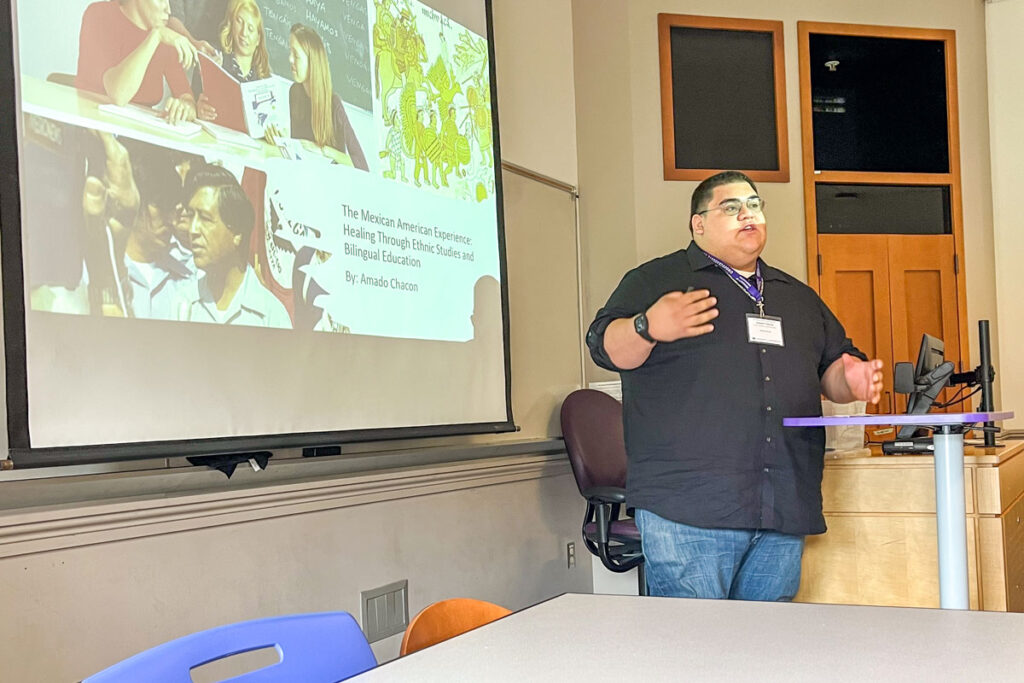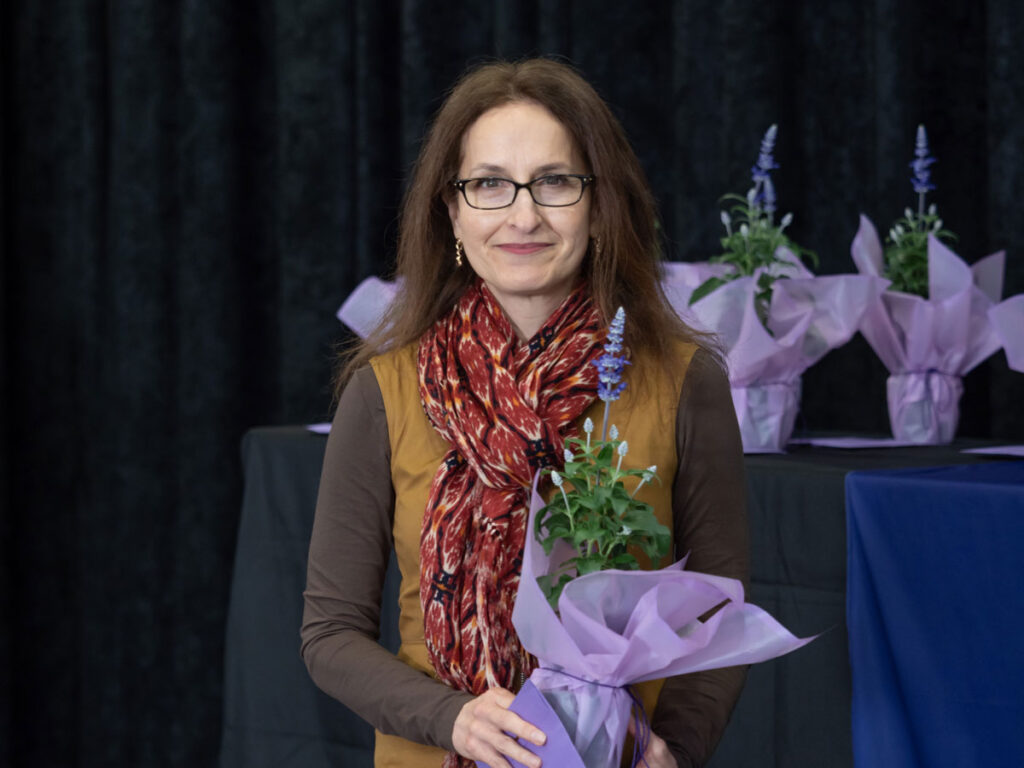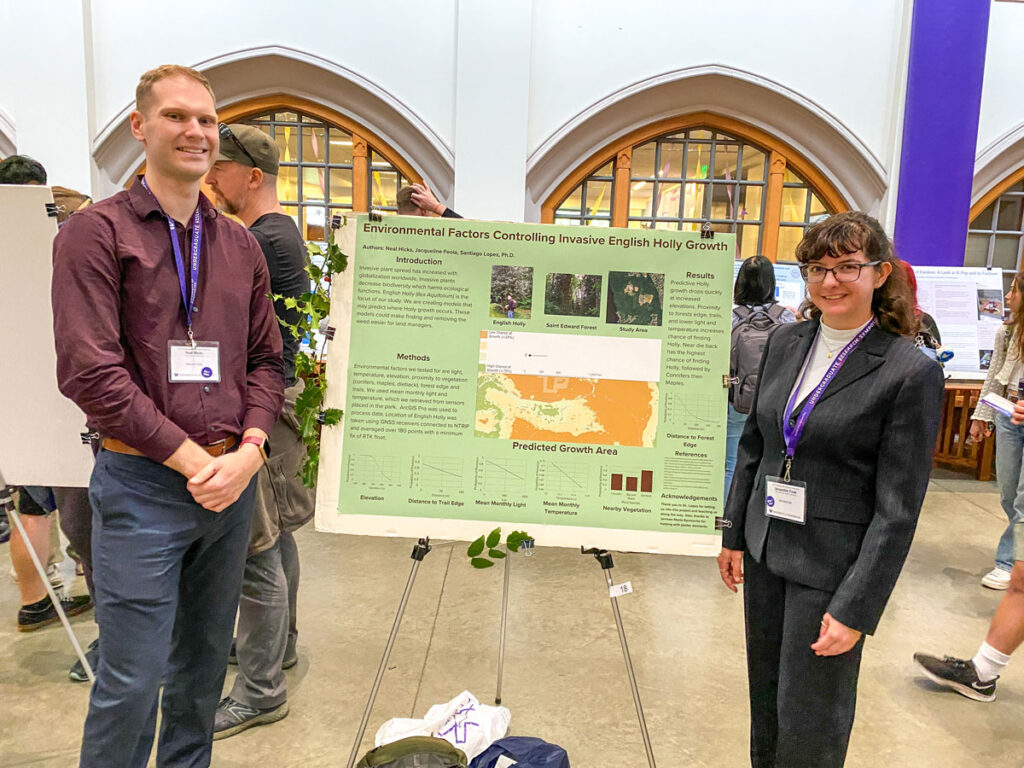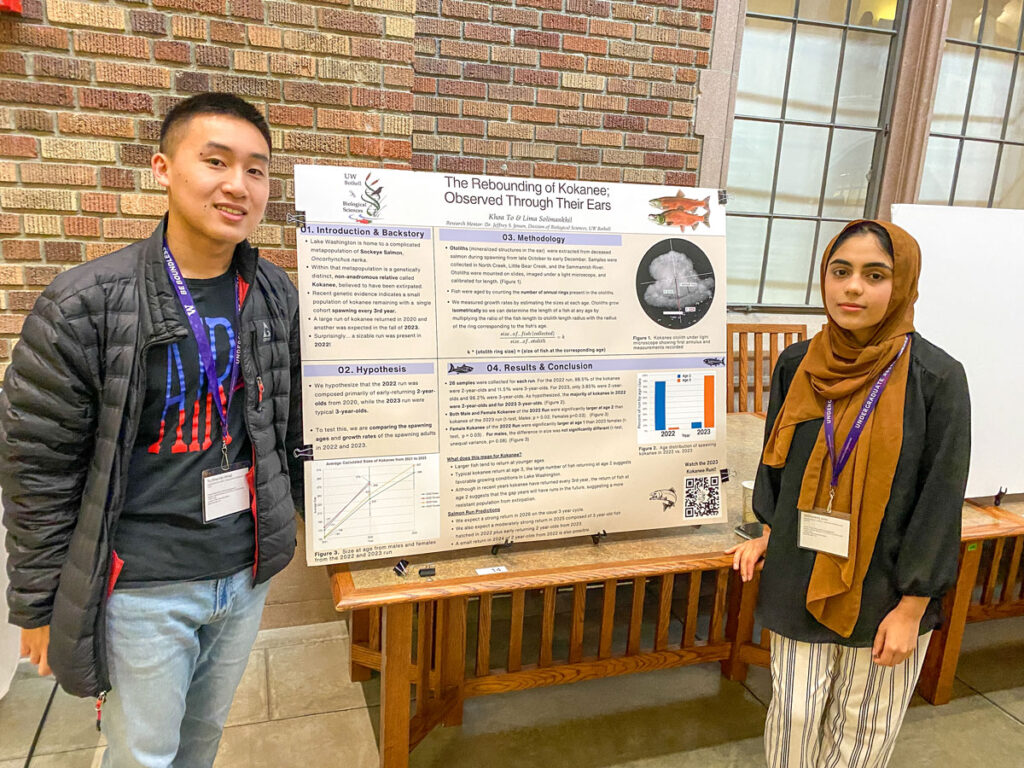At the University of Washington, the close of the academic year is a time to look back on the hard work and accomplishments of its students. Among the many achievements worth celebrating is the breadth and depth of undergraduate research that students from across the UW community present in an annual symposium.
“Each year, nearly 1,000 students from all three UW campuses and other local institutions present their research spanning over 100 disciplines,” said Dr. Sophie Pierszalowski, director of the UW’s Office Undergraduate Research. “Undergraduates present work from astronomy to visual arts, international studies to psychology, anthropology to bioengineering — and just about everything in between.”
In the 27th Annual Undergraduate Research Symposium this May, more than 30 students from UW Bothell presented their work at Mary Gates Hall in Seattle on 21 different research projects and topics, from “Tax Policy and Developing Nations” to “Using Transcranial Magnetic Stimulation for Memory Loss in Early-Stage Alzheimer’s Disease.”
The event is not only a time to honor students but also the mentors who supported them and made their work possible.
The support of a mentor
During the symposium, Outstanding Undergraduate Research Mentor Awards were presented to eight recipients, including Dr. Yolanda Padilla, associate professor in UW Bothell’s School of Interdisciplinary Arts & Sciences.
“It was a wonderful surprise,” Padilla said. “Amado Chacón is the student who nominated me, and I’ve always told him what an excellent writer he is. When I found out I won the award, I said to him, ‘Now do you believe me? Your words are powerful!’”
Padilla worked with Chacón (Culture, Literature & the Arts, ’24) on his senior thesis project, “The Mexican American Experience: Healing Through Ethnic Studies and Bilingualism.” His project examined the role that ethnic studies curricula can play in the process of healing the generational trauma suffered by Mexican American communities.
“I was deeply impressed by how interdisciplinary his approach was,” Padilla said. “He conducted interviews, engaged in literary analysis and worked through complex theoretical works. He presented at the Student Academic Showcase at UW Bothell and at the Undergraduate Research Symposium.
“His parents and siblings went to both events,” she said, “and it was so cool to see their pride as they listened to Amado present his work. Meeting them was a highlight of my year.”


Drawing from experience
Chacón first met Padilla in her “Intro to Latino Studies” course and asked her to be his mentor for his thesis. The project was a personal one drawn from his own life experiences.
“I grew up in a large Latino community and saw many of the issues I discussed in my project,” he said. “I noticed the problems of culture, a lack of historical knowledge and an overall lack of academic motivation — issues that were further highlighted to me when I graduated high school. I saw all these intelligent students go straight into the workforce rather than go to college. So, I had this general knowledge and understanding, but I didn’t know how to define or address the issue. This project gave me the space to do that.”
In his project, Chacón examined the negative effects of the U.S. education system while also offering potential solutions to the issues he highlighted. He posited that both ethnic studies and bilingual education could better support Latin American students.
Padilla said her role as a mentor is a multifaceted one that varies from providing research support to acting as a cheerleader when a student’s energy flags.
“It was an incredible experience,” Chacón said. “Professor Padilla had this great balance of giving me the freedom to focus on what I wanted while also helping guide my research. But what was most helpful was how she helped motivate me to continue.
“Without her encouragement and support,” he said, “I would have never done this project or taken part in the research symposium. I was satisfied that she got the recognition she deserved.”
Professor Padilla had this great balance of giving me the freedom to focus on what I wanted while also helping guide my research. But what was most helpful was how she helped motivate me to continue.
Amado Chacón, Culture, Literature & the Arts, ’24
Mapping an invasive species
In their project, “Possible Environmental Factors Influencing Invasive Plant Spread,” Neal Hicks (Earth System Science, ’24) and Jacqueline Feola (Environmental Studies, ’24) took a close look at three local but invasive species.

Under the mentorship of Dr. Santiago Lopez, associate professor in the School of IAS, they plotted the locations of English holly, cherry laurel and Portuguese laurel in Saint Edward State Park, site of the UW Bothell-led Environmental Education & Research Center.
“These are weeds of concern in King County, and we don’t know what environmental factors lead to where they grow,” Hicks said, “so we sought to find that out.”
The research pair collected data on a number of factors, including elevation, trail edge, light, monthly average temperature and nearby vegetation. They then plotted the locations of the plants on a map to analyze which factors appeared to be most important.
“The ultimate goal is to create maps that the land managers can use at Saint Edward to find these invasive species,” Hicks said. “If they can find them easier and remove them, then they’ll have less of an impact on the biodiversity of the forest.”
Monitoring salmon populations
Junior pre-majors Khoa Van and Lima Solimankhil looked to get a better picture of the local salmon populations in their project, “Age Distribution in a Complex Metapopulation of Oncorhynchus nerka in Lake Washington.”

The students determined the age and population size of several species, working under the mentorship of Dr. Jeffrey Jensen, teaching professor in UW Bothell’s School of STEM and an ichthyologist who researches salmon and other fish.
Van and Solimankhil supported Jensen’s latest research looking into the distribution, history and restoration of kokanee salmon in the Lake Washington and Sammamish watershed. After the native kokanee population crashed in the 20th century, it has remained unclear whether they persist today and may someday bounce back.
Together with his student researchers, Jensen aims to establish whether they can still be found in the watershed and assess the potential for their restoration or reintroduction.
Using salmon collected from the lake, the students determined their age by extracting the otoliths — a structure in the ear that contains annual rings similar to those on tree trunks. They collected and inspected 26 samples from both the 2022 and 2023 salmon runs. While more research is needed, their project results indicate that growing conditions might be favorable for future runs of the species.
Countless avenues of research
The presentations in this year’s symposium represent the broad range of research, scholarship and creative practice projects students can undertake during their undergraduate studies. A complete list of the research projects presented by UW Bothell students this year can be found on the UW’s Undergraduate Research Symposium website.




